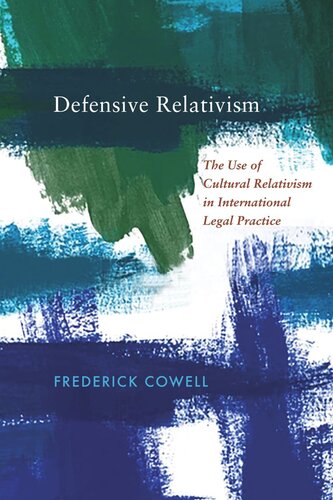

Most ebook files are in PDF format, so you can easily read them using various software such as Foxit Reader or directly on the Google Chrome browser.
Some ebook files are released by publishers in other formats such as .awz, .mobi, .epub, .fb2, etc. You may need to install specific software to read these formats on mobile/PC, such as Calibre.
Please read the tutorial at this link: https://ebookbell.com/faq
We offer FREE conversion to the popular formats you request; however, this may take some time. Therefore, right after payment, please email us, and we will try to provide the service as quickly as possible.
For some exceptional file formats or broken links (if any), please refrain from opening any disputes. Instead, email us first, and we will try to assist within a maximum of 6 hours.
EbookBell Team

4.1
60 reviewsIn Defensive Relativism, Frederick Cowell argues that defensive relativism is a variety of tactical argument used by states to justify ignoring international human rights law and that it is a reflection of unresolved tensions about the nature of what it means for rights to be universal.
Defensive Relativism describes how governments around the world use cultural relativism in legal argument to oppose international human rights law. Defensive relativist arguments appear in international courts, at the committees established by human rights treaties, and at the United Nations Human Rights Council. The aim of defensive relativist arguments is to exempt a state from having to apply international human rights law, or to stop international human rights law evolving, because it would interfere with cultural traditions the state deems important. It is an everyday occurrence in international human rights law and defensive relativist arguments can be used by various types of states. The end goal of defensive relativism is to allow a state to appear human rights compliant while at the same time not implementing international human rights law.
Drawing on a range of materials, such as state reports on the Convention on the Elimination of All Forms of Discrimination Against Women (CEDAW) and cases from the European Court of Human Rights involving freedom of religion, this book provides a definitive survey of defensive relativism. Crucially, Frederick Cowell argues, defensive relativism is not about alternative practices of human rights law, or debates about the origins or legitimacy of human rights as a concept. Defensive relativism is instead a variety of tactical argument used by states to justify ignoring international human rights law. Yet, as Cowell concludes, defensive relativism can’t be removed from the law, as it is a reflection of unresolved tensions about the nature of what it means for rights to be universal.